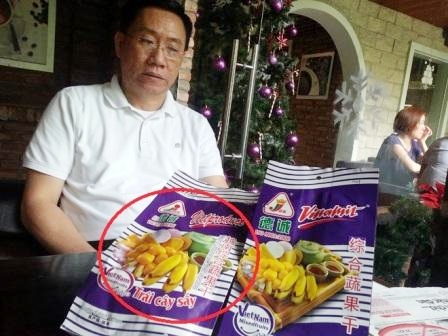Vinamit wins Chinese brand name dispute
 The Beijing People’s Court ruled in late December in favour of the Vietnamese Vinamit JSC after the firm’s Duc Thanh brand was illegally used by Chinese distributor Xie Hong Yi. The result followed four years of legal wrangling involving three court hearings.
The Beijing People’s Court ruled in late December in favour of the Vietnamese Vinamit JSC after the firm’s Duc Thanh brand was illegally used by Chinese distributor Xie Hong Yi. The result followed four years of legal wrangling involving three court hearings.
“The success of the case could ensure robust growth for our food, coffee and dried fruit brands in the Chinese market,” said Vinamit’s general director Nguyen Lam Vien.
Vinamit, established in 1996, has now grown into a major food producer after modest beginnings. It began exporting products to China in 1997 after the company had successfully carved out a niche in the domestic market for its dried tropical fruits and processed food.
“I registered Vinamit products for exclusive brand protection in Vietnam back in 1993 when Vinamit was just a small trading unit. When we entered the Chinese market, I also took the initiative to ensure trademark protection but I was still the victim of an illegal brand appropriation case,” said Vien.
Under Chinese law, foreign products sold in China also need a local name in parallel to their original brand name.
“When I tried to get exclusive brand protection in China for Vinamit products, I realised that another person had already completed the procedures,” Vien recalled when hearing that Vinamit products had been registered by their Chinese distributor Xie Hong Yi.
By 2009, Vinamit was desperate, as the firm was on the verge of losing their entire Chinese market share.
“We couldn’t wait any longer. In 2010, the company had taken the decision to invest in China for the long-term through the establishment of a company in Guangzhou and representative offices in Nanning, Beijing and Shanghai. Directly selling products through China’s largest supermarket chains such as Wal-mart or Lotus would magnify our brands,” said Vien.
Vien’s decision entailed conflicts with the Chinese cross-border trade partner who attempted to oust Vinamit products from both Chinese supermarkets and traditional markets.
The Chinese partner took steps to claim the Duc Thanh brand as their own.
“There were two scenarios at that time. First, negotiating with the Chinese partner, but this option was unfeasible since the Chinese partner seemingly did not want to play fair. So we filed a case against the Chinese partner for the illegal appropriation of the Duc Thanh brand,” said Vien.
In June 2010, Vinamit lodged a petition to the Trademark Office under the State Administration for Industry and Commerce through a Chinese representative asking for the transfer of ownership of the disputed brand.
In November 2011, Vinamit handed in a petition to the trade mark body proposing that it should reclaim its disputed brand name. It argued that the Chinese partner had impinged on clauses in the Trade Law and needed to return the brand name to the rightful owner.
In July 2012, the Beijing People’s Committee backed the confiscation of the Duc Thanh brand from the Chinese partner. The Chinese partner did not accept the result and lodged an appeal.
In November 2012 the court convened for the third time and delivered a verdict again in favour of the Vietnamese company.
“I made direct contact with Chinese government calling on its support. Our aim was to ensure that made-in-Vietnam products aren’t only protected in Vietnam,” said Vien.
In respect to Vinamit’s successes in China, Vien said “Exporting products via official channels is crucial to registering brand protection abroad. Vinamit founded its head office in Guangzhou and placed its name on all our products entering China through official channels, whereas the Vinamit products imported by our partner only carried the name of the Chinese partner. Consumers can make a comparison and often prefer products that have been imported through official channels, thanks to their better quality.”
What the stars mean:
★ Poor ★ ★ Promising ★★★ Good ★★★★ Very good ★★★★★ Exceptional
Related Contents
Latest News
More News
- Hermes joins Long Thanh cargo terminal development (February 04, 2026 | 15:59)
- SCG enhances production and distribution in Vietnam (February 04, 2026 | 08:00)
- UNIVACCO strengthens Asia expansion with Vietnam facility (February 03, 2026 | 08:00)
- Cai Mep Ha Port project wins approval with $1.95bn investment (February 02, 2026 | 16:17)
- Repositioning Vietnam in Asia’s manufacturing race (February 02, 2026 | 16:00)
- Manufacturing growth remains solid in early 2026 (February 02, 2026 | 15:28)
- Navigating venture capital trends across the continent (February 02, 2026 | 14:00)
- Motivations to achieve high growth (February 02, 2026 | 11:00)
- Capacity and regulations among British areas of expertise in IFCs (February 02, 2026 | 09:09)
- Transition underway in German investment across Vietnam (February 02, 2026 | 08:00)

 Tag:
Tag:




















 Mobile Version
Mobile Version